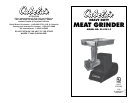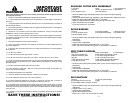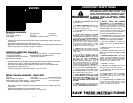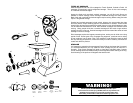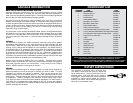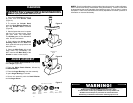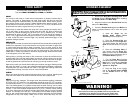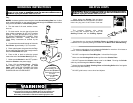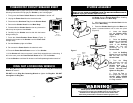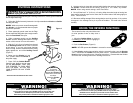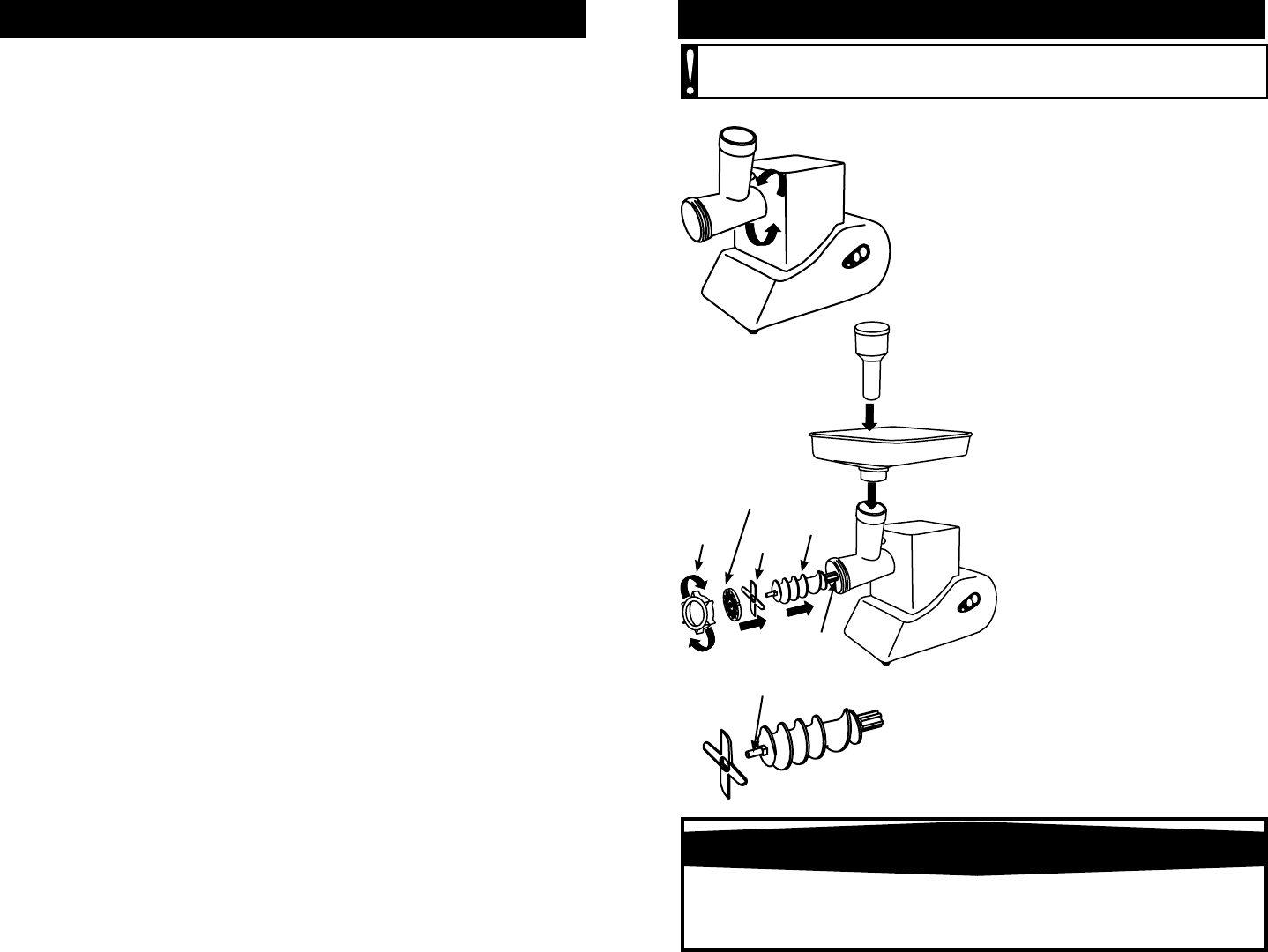
-7-
-14-
GRINDER ASSEMBLY
1. Remove the Ring Nut, Grinding Plate, Knife
and Auger from the Grinder Head before installing
the Grinder Head to the Main Body.
2. Align the notches on the Grinder Head with the
tabs on the Main Body.
3. Press the Grinder Head against the Motor and
rotate it counterclockwise until it locks into place
(Figure D).
4. Insert the Auger into the
Grinder Head, Auger Driver
Assembly end rst (Figure E).
5. Place the Grinder Knife onto
the square portion of the Auger Pin.
The cutting edges (at side) of the
Knife should be facing out (Figure
F).
6. Place the Grinding Plate of
your choice onto the Auger Pin.
Make sure the notch of the Grinder
Plate ts into the positioning pin of
the Grinder Head (Figure E).
7. Turn the Ring Nut clockwise
onto the threaded end of the Grinder
Head until it touches the Grinder
Plate and is snug. DO NOT over-
tighten the Ring Nut.
8. Place the Tray on the upright
part of the Grinder Head. NEVER
use the Grinder without the Tray
installed!
Figure D
Figure E
Figure F
WARNING! Before cleaning, assembling or disassembling the Grinder,
make sure the PLUG IS REMOVED FROM THE OUTLET/POWER SOURCE!
ALWAYS unplug the Grinder when not in use.
NEVER operate Grinder without the Tray secured in place.
To avoid serious or fatal injury, NEVER reach into any Grinder inlet.
ALWAYS use the Stomper to push food into the Grinder Head.
Read & fully understand all instructions & warnings prior to use.
WARNING!
Auger
Pin
Cutting edges of the Knife facing out.
Front Ring
Nut
Grinder
Plate
Grinder
Knife
Auger
Assembly
Grinder
Head
Tray
Stomper
with Lid
Auger
Driver
There are basic rules to follow when handling food.
They are COOK, SEPARATE, CLEAN, and CHILL.
COOK
It’s crucial to cook food to a safe internal temperature to destroy bacteria that is
present. The safety of hamburgers and other foods made with ground meat has
been receiving a lot of attention lately, and with good reason. When meat is ground,
the bacteria present on the surface is mixed throughout the ground mixture. If this
ground meat is not cooked to at least 160
o
F to 165
o
F (71
o
C to 74
o
C), bacteria will not
be destroyed and there’s a good chance you will get sick.
Solid pieces of meat like steaks and chops don’t have dangerous bacteria like E.
coli on the inside, so they can be served more rare. Still, any beef cut should be
cooked to an internal temperature of at least 145
o
F (63
o
C) (medium rare). The safe
temperature for poultry is 180
o
F (82
o
C) and solid cuts of pork should be cooked to
160
o
F (71
o
C). Eggs should be thoroughly cooked too. If you are making a meringue
or other recipe that uses uncooked eggs, buy specially pasteurized eggs or use
prepared meringue powder.
SEPARATE
Foods that will be eaten uncooked and foods that will be cooked before eating MUST
ALWAYS be separated. Cross-contamination occurs when raw meats or eggs come
in contact with foods that will be eaten uncooked. This is a major source of food
poisoning. Always double-wrap raw meats and place them on the lowest shelf in the
refrigerator so there is no way juices can drip onto fresh produce. Then use the raw
meats within 1-2 days of purchase, or freeze for longer storage. Defrost frozen meats
in the refrigerator, not on the counter.
When grilling or cooking raw meats or sh, make sure to place the cooked meat on
a clean platter. Don’t use the same platter you used to carry the food out to the grill.
Wash the utensils used in grilling after the food is turned for the last time on the grill,
as well as spatulas and spoons used for stir-frying or turning meat as it cooks.
Make sure to wash your hands after handling raw meats or raw eggs. Washing hands
with soap and water, or using a pre-moistened antibacterial towelette is absolutely
necessary after you have touched raw meat or raw eggs. Not washing hands and
surfaces while cooking is a major cause of cross-contamination.
CLEAN
Wash your hands and work surfaces frequently when you are cooking. Washing with
soap and warm water for at least 15 seconds, then dry with a paper towel.
CHILL
Chilling food is very important. The danger zone where bacteria multiply is between
40
o
F and 140
o
F (4
o
C and 6
o
C). Your refrigerator should be set to 40
o
F (4
o
C) or below;
your freezer should be 0
o
F (-17
o
C) or below. Simple rule: serve hot foods hot, cold foods
cold. Use chang dishes or hot plates to keep food hot while serving. Use ice water
baths to keep cold foods cold. Never let any food sit at room temperature for more than
2 hours - 1 hour if the ambient temperature is 90
o
F (32
o
C) or above. When packing
for a picnic, make sure the foods are already chilled when they go into the insulated
hamper. The hamper won’t chill food - it just keeps food cold when properly packed
with ice. Hot cooked foods should be placed in shallow containers and immediately
refrigerated so they cool rapidly. Make sure to cover foods after they are cool.
FOOD SAFETY



